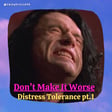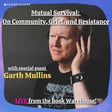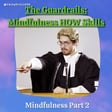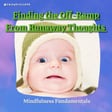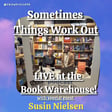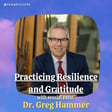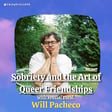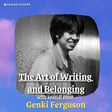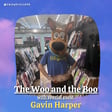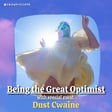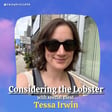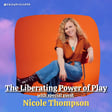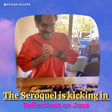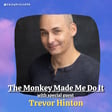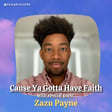Become a Creator today!Start creating today - Share your story with the world!
Start for free
00:00:00
00:00:01

I'm Not at Capacity, I Just Don't Want To (Solo)
In this solo episode, James Avramenko returns from a short break to unpack a whirlwind of thoughts, feelings, and cultural critiques. From creative burnout and refusing the algorithm grind, to the power (and misuse) of the word "capacity," this episode goes deep.
James shares insights from nearly two years of sobriety and reflects on what showing up authentically really looks like—at Pride, in friendships, and on the mic. There’s also some spicy etymology, a meditation on complicated legacies, and a surprisingly emotional ode to professional wrestling.
No easy answers, no purity tests—just nuance, honesty, and a little chaos.
Topics Covered:
- Burnout and creative boundaries
- The pressure of constant content creation
- Rethinking the word “capacity”
- Sobriety and sober joy at Pride
- Why language matters (and how it can be weaponised)
- Wrestling, legacy, and Hulk Hogan’s complicated place in history
- Public shaming, surveillance culture, and online punishment
- Owning your part in collective problems—and how to move forward
Get in Touch:
- Email: friendlesspod@gmail.com
- Instagram/TikTok: @friendlesspod
- Sign up for the Friendless Substack
Support the show:
- Buy Me A Coffee!
- Share with a friend who needs to hear it.
- Leave a review.
- Tell James you’re proud of him (seriously, he loves that stuff).
Create your podcast today! #madeonzencastr
Transcript
Introduction and Episode Overview
00:00:08
Speaker
Well, hey there, sweet peas. Welcome back to Friendless. I'm your host, James Avramenko, and it is officially August, the best month of the year. The sun's out, the days are long, my birthday's just around the corner, so what better way to kick off the month than with a little bit of a solo catch-up episode?
00:00:26
Speaker
I'm going try touching on creative burnout, reframing the insidious word capacity, hitting yet another sobriety milestone, and of course, pro wrestling, baby.
00:00:38
Speaker
ah So let's get into it. It's time to lean back, get comfy, set your volume at a reasonable level, and enjoy my solo episode to kick off August here on Friendless.
Challenges of Content Creation
00:00:47
Speaker
So right off the bat, um I feel like I got to own that, you know, i missed last couple of weeks.
00:00:55
Speaker
uh there's been no emergency no great scandal it's just kind of been life um traditionally i end up taking july august off from the show um and and i feel like i've been reminded why because like uh my regular work really ramps up in the summer and i just don't have uh the priorities um and the space for those priorities as i want to but um It really ah has reminded me of one of these things i often ah think of and try try to sort of chew on is this idea of like, you know, the the the pressure for creative work in this kind of like algorithm-driven world is...
00:01:45
Speaker
um Unreal. And anyone who tries to push back on that, um my opinion, is committing ah a radical act.
00:01:56
Speaker
And it really comes down to this difficult balancing act. Because, you know, the thing is that, like, the show is kind of... Like my baby, like I love doing it. It feeds me creatively, emotionally.
00:02:10
Speaker
it it It's helped me kind of make sense of the world in a way. And I'm also like just one guy. You know, I'm the host, I'm the editor, I'm the social media manager, I'm the marketing, whatever it is.
00:02:25
Speaker
I'm the guy doing it all. and And this isn't me trying to evoke sympathy or anything like that. It's just me reminding myself that um my priorities are allowed to shift and I do not have to hold myself to these artificial standards that these social media platforms have created in order to maximize their profits.
Authenticity Over Algorithms
00:02:47
Speaker
um You know, they want creators to be churning out all the time as much as possible so that the metrics reflect well on them. People go to their platforms.
00:02:58
Speaker
It's not for the benefit of the artist. It's for the benefit of the advertisers. They create this kind of insidious belief that if you're not constantly creating, constantly posting, constantly engaging, then you are a failure.
00:03:13
Speaker
um And they have created this this image that success is tied only to constant ample amplified visibility. You know, if you're you're not top of the feed, then you're you're falling behind.
00:03:26
Speaker
And for me personally, that chase just doesn't work. I just don't want to play that game. Because that game is exhausting and it's relentless and more to the point, it's just simply not sustainable.
Avoiding Burnout
00:03:40
Speaker
So I've been reminding myself that you know this show is not a product on a conveyor belt. It's not content to be optimized. It's a mindful space. It's a space that I get to speak authentically you know, for myself to other people.
00:03:57
Speaker
um It's a place for reflection, a place for experimentation. And that means something. It means something to me. it It means something to to what I put out in the world.
00:04:08
Speaker
It also means sometimes I just need a little bit of a breather. Right? You know, like sometimes it's sometimes inspiration just kind of needs to simmer a little bit. um And like, I get it. I'm not I'm not breaking any new ground here. I'm not the first person to talk about creative burnout.
00:04:25
Speaker
But but what I'm trying to do differently is how I personally respond to it. um I'm actively not going to, you know, flog myself for stepping back for a week or two. I'm i'm not going to shame myself or or push out more more content just so that I can remain visible if it's half-baked or if it isn't exactly what I intend it to be.
00:04:48
Speaker
And I mean, shit, you know, that means the show grows... Slowly? Cool. If some people unsubscribe or because I missed a week or two, like that's fine. you know I'd much rather have a couple actively engaged listeners than thousands who are just kind of scrolling by anyway. so um you know I'm not trying to get on my high horse here, but...
00:05:12
Speaker
One of the places that this really came into focus for me over the last year has been on
Intentional Content Creation
00:05:16
Speaker
TikTok. you know um I've had videos where I've posted and nothing's happened. I've had i've posted some and they've exploded.
00:05:23
Speaker
and And there doesn't seem to be any kind of rhyme or reason to it. it's It's basically like the lottery in a lot of ways. um And so, you know, for me personally, the the effort that goes into um a video get that gets 100 views a video that gets a million is the same amount.
00:05:45
Speaker
And that tells me that this is just roulette. um And I just i can't bring myself to um keep on pulling the lever. ah You know, because it's it's my desire to create with intention, ah not just out of compulsion.
00:06:03
Speaker
And i don't know maybe maybe maybe you're somebody who is struggling with something similar and you needed someone like me to say like, hey, it's okay to take a step back. It's okay to pause.
00:06:13
Speaker
You know, nobody nobody's in danger if a podcast episode doesn't come out on time. Right? um You know, no one's life is being threatened if you don't make that TikTok post.
00:06:27
Speaker
But that, okay, so, like, that's that sort of, that's the energy I'm bringing to the party these days. ah So, you know, let's say I've set the table here, and and we can move into some of the some of the sort of deeper thoughts I've been chewing on.
Redefining 'Capacity' and Communication
00:06:42
Speaker
First thing is something that's come out of some therapy sessions recently that has really been of rattling around in my mind. um And it's this word, capacity.
00:06:54
Speaker
um I have used this word. i have heard it used. I think everyone has has has thrown it out in some way, shape, or form, you know in some capacity.
00:07:05
Speaker
Ha, ha, ha. ah over the recent you know couple of years, it's become really popular. you know We say things like, you know oh, I'd love to, but I just don't have capacity right now. you know I'm at capacity. um It's become this kind of like polite shorthand, this this sort of like socially acceptable way of saying I can't or I won't or I don't want to.
00:07:26
Speaker
And When you sit with it, you know, it sounds responsible. It sounds like it's, you know, emotionally intelligent. And on sort of on face value, it seems to be signaling, you know, I'm not ghosting you. I'm just I'm just tapped out.
00:07:41
Speaker
But here's where, you know, my therapist shout out, Scott, as always. Love you. um but where he stepped in we were having a session a couple weeks ago i don't know how long ago this was now but um and we were kind of celebrating some of my my my accomplishments and some of the really really deep work that i've implemented and is like very clearly sticking and like how good i'm doing and then i started slipping into yet another kind of Well, was me moment, and and I started saying, you know, I want to do all this stuff, but I'm at capacity. And and and he he offered a very gentle kind of reframe where he asked me, you know, would you be up for a new challenge? and I said, yeah, sure, of course. And he said, what if you stopped using the word capacity altogether?
00:08:31
Speaker
And like, you know, at first thing I kind of thought it was a bit of a joke, but then his his reasoning was really sound and it's something that's really stuck with me because he was saying when you actually sit with this word, it's nonsense the way we're using it.
00:08:43
Speaker
um And it it actually is really insidious and it's it's. whether it's consciously or unconsciously, quite manipulative, because what it's doing is it's allowing us to avoid saying what we actually mean.
00:08:58
Speaker
Because to get really ah pedantic, stay with me here, um our actual capacity doesn't change. It's sort of, you know, think of like a ah gas tank, right? the The gas tank stays the same, right?
00:09:14
Speaker
What you have the capacity to handle doesn't actually change. What changes is how much fuel is in it. So when I say I don't have capacity, um what I'm really doing is two things at once.
00:09:27
Speaker
I'm avoiding honestly answering a question, and I'm also shifting the emotional labor onto the other person. So, okay, let me let me give you an example.
00:09:39
Speaker
someone invites me to a party and i say oh i'm just i'm at capacity this weekend i've now made them responsible for comforting me so i've asked them to hold space for my supposed depletion when in reality what i actually want to say is, I don't want to go to your party.
00:09:59
Speaker
And that's, you know, that's not that's not a judgment. That's not all because you're bad. It's just, you know, it's just the truth. I don't want to. um But instead of saying, no thanks, I don't want to, or it's just not something I want to do, or whatever whatever you want to say, I'm now using this really polished, therapeutic-sounding language to dodge discomfort.
00:10:19
Speaker
And, you know, that's what we call people-pleasing. Right. You know, it's a people pleaser with a thesaurus. Right. And like, you know, I get it. i get it. i mean, the reason I'm calling this out is because I do it.
00:10:32
Speaker
um You know, we we're trying to to navigate ah setting boundaries without hurting people. But when those boundaries get blurred under this kind of.
00:10:45
Speaker
um
00:10:47
Speaker
pseudo-therapy speak like with the word capacity we're not actually being kind we're being unclear and that is completely unfair to everyone involved it's that it's that tweet that you might have seen floating around where it's like oh you're a people pleaser name three people who are pleased with you right like it's People-pleasing is so useless because there's a difference between um ah protecting your peace and just being an avoidant, right? And so this this idea of of, oh, I'm just going to say the thing that will will keep them settled, but that's...
00:11:26
Speaker
really a form of psychological abuse if you want to get hyperbolic with it because that is a way to to politely lie to each other so instead i'm leaning into just direct but kind communication and um instead of you know saying oh i get i can't i oh i make but whatever you know i just say like hey Thank you so much for the invite. I'm not feeling social right now or, you know, it's just not something I'm up for.
00:11:54
Speaker
ah But I really appreciate the thought. And yeah, it's a lot scarier, um but it's also clearer. You know, it's honest and it gives the other person real information.
00:12:07
Speaker
And when you start treating adults as
Two Years of Sobriety
00:12:11
Speaker
adults, you'll find that they really appreciate that. Because we all collectively can see that these statements are bullshit, but for whatever reason, we're not calling it out because on the other side, you know the other person is just as afraid of conflict, right?
00:12:25
Speaker
So it creates this weird, murky, like friends but not really friends because we're not ever actually speaking truthfully or authentically to each other. and And I mean, what could be less authentic than we can't just speak directly to each other?
00:12:42
Speaker
um how How could you possibly trust this connection if you can tell that the other person is dressing up their their answers in these costumes that that don't actually reflect the intention behind them?
00:12:55
Speaker
I don't know if it's if it's, you know, some one of my my ransom letter letters, you know, what what would I don't know if it's my my autism or my my whatever, or if it's just the fact that I am a writer. I don't know what it is, but to me, language matters.
00:13:14
Speaker
It shapes how we show up in the world. It shapes how we understand the world and how we understand ourselves. It shapes how we treat each other. And when we misuse it, even if it's with good intentions, we end up confusing everything.
00:13:29
Speaker
Language is already in price imprecise enough. We don't need to be actively muddying the waters with our sort of obfuscating language. Another sort of version of that, a kind of ah another angle is is, you know, how we talk to ourselves.
00:13:44
Speaker
Something like if we were to frame um when we treat when we frame our choices as failures. Right. You know, I made a mistake. I screwed up. You know, what we're doing is we end up burying ourselves in shame and shame leads to hiding.
00:13:59
Speaker
Right. Shame doesn't teach someone not to do something. It teaches them how to hide that thing going forward. So if instead of castigating yourself and saying, oh, you've made a mistake, why did you do that? Instead you say, well, you know what?
00:14:13
Speaker
That didn't turn out the way I hoped, but I made the best choice I had with the information I had. um Now I get to make a different decision, right? So instead of framing them framing them as failures, just framing them as as decisions that didn't have the outcome you wanted.
00:14:28
Speaker
What that does is it encourages curiosity and encourages ah space for growth and for experimentation and for trying again. It invites compassion for yourself and then you are able to show up compassionately for others.
00:14:41
Speaker
And that all stems from clarity and honesty. um And that's what I'm really trying to lean into, you know, um not not just one or the other, but both being clear, being honest and remaining kind behind that.
00:14:57
Speaker
So if you ever you know if you ever hear yourself saying you're at capacity, I'm not trying to say like you're you're wrong and you're bad, but you know if you if you if you catch yourself saying that, I would invite you to ask yourself, what do you actually mean here?
00:15:10
Speaker
um And what would it look like if you just said that instead? It's hard. I get it. It's really, really vulnerable. But it's also really liberating.
00:15:22
Speaker
You know, as as Scott has said in the past, you cannot be authentic without being vulnerable. and You cannot be vulnerable without risking being killed because you have to show your soft bits.
00:15:33
Speaker
And so I would really encourage you, you know, i don't that doesn't mean show your belly to everyone, but like I would really encourage you to show your belly to the people who, you know, aren't going to hurt you.
00:15:43
Speaker
And if you're really that afraid, then that's actually a deeper ah moment that you should be exploring around that connection. And that kind of that kind of leads me into my next thought. This is kind of a little bit of a puppy pile of a couple of thoughts, but I wanted to ah kind of reflect on I'm about to hit um ah two years sober.
00:16:06
Speaker
And one of the ways I celebrated recently um was going to a big Pride event. um It was Pride in Vancouver this last weekend. And I went and I did i did this event completely sober. It was a daytime party at the birdhouse. It was amazing. It was so much fun.
00:16:25
Speaker
and um it really ah sent me down a new rabbit hole of exploration of kind of what um but sobriety means and what my relationship to these substances was and how do I describe that to myself and to the world.
00:16:43
Speaker
Because, you know, it's... it's it's It's been a long two years. I'll say that much. you know ah Two years without alcohol or substances that I used to use as my so not only my social lubrication, but also my my my my my coping mechanisms.
00:16:59
Speaker
you know um And I've spent the last two years really, really diligently analyzing myself and figuring out who it is I am and who it is I want to become without being able to numb myself or or or close any piece of reality off from my my nervous system.
00:17:19
Speaker
And I think I want to sidebar here, you know, as as I talk about this, This isn't going to be one of those like, here's how I did it and I've got the answer. And I also really don't want to come across like I'm finger wagging at anybody because I do not believe that sobriety is a ah moral imperative.
00:17:37
Speaker
um I genuinely believe that people can have a healthy relationship with basically any substance. You know, weed, alcohol, black tar heroin, whatever's in white cloth,
00:17:50
Speaker
I don't know I don't care what it is that doesn't mean you know a healthy relationship doesn't mean constant user right and what it means is they have some kind of healthy connection where they're drawing what they need from that substance and then putting it away and I couldn't do that um and the way I've started describing it is that I was in yet another abusive relationship I was in an abusive relationship with drugs and alcohol and I in that relationship was the abuser.
00:18:21
Speaker
I was the one misusing these tools and i wasn't listening to what they could offer and instead I was using them for what they couldn't and that was leading to problems.
00:18:33
Speaker
And in that abusive cycle, I lost my right to that relationship and I had to close the door on that one.
00:18:44
Speaker
And it ah this Pride event really drove that home for me um because I was terrified. I was dreading it. ah Not because I thought, like, oh, I was going to relapse, but more because it was like, am I going to be able to have any fun?
00:18:58
Speaker
And the truth was it was an absolute fucking joy. um You know, I saw people I hadn't seen in ages. danced. I reconnected. and and and i was just I was sober the whole time just having the absolute time of my life. And and the best part of it it was that it wasn't performative.
00:19:14
Speaker
It wasn't you know, I wasn't grating my teeth. i wasn't just like trying to stay good. it was you know, I wasn't white knuckling anything. I was just genuinely present and like there was a ton of anxiety i was terrified of who I was gonna be who I was gonna see I was terrified of how is gonna be perceived i I didn't know if people were gonna you know accept me there or if there were gonna be old judgments or resentments or whatever and like, you know, there were a couple of those but also like whatever, you know, um If you're going to be burning your own calories holding a grudge over something that happened two years ago, that's your energy to waste.
00:19:55
Speaker
I have no interest in it anymore. But that's the fsa side part. But really what it what what ended up landing for me, was most surprisingly, was that I didn't feel like by being sober I was missing out on anything.
00:20:07
Speaker
I didn't look around and think, oh, I'd be having more fun if I was drinking. if anything, i felt like I was having but most fun because i was there. i was was present. I was dancing. I was laughing. I was connecting. I was talking. was, you know, and...
00:20:25
Speaker
i also ah i got it I did this thing on the dance floor where I sort of almost did like a kind of like a little bit of ah a method acting thing where um I basically just sort of imagined what it used to feel like to be high or tipsy or whatever. And I just let myself kind of play that.
00:20:43
Speaker
And it really worked. you know i danced. I let loose. I got weird. i i i Because I wasn't relying on something else to give me that feeling. I was giving it to myself.
00:20:54
Speaker
and it And it reminded me that you know the desire wasn't really for the substance itself. The desire was for the feeling. And i you know two years were removed, have have through practice and through trial and error, found ways to give myself that feeling without needing the shortcuts.
00:21:14
Speaker
um I will also say, actually, ah sunglasses. Sunglasses changed my life. Absolute game changer. I got a pair of prescription sunglasses for the first time this year. And I know it sounds really silly, but honestly, as someone on the spectrum, there is something completely magical about having my eyes hidden.
00:21:31
Speaker
It made me feel a lot like like safer and less exposed. like I was kind of like in my own little bubble. um And that made public spaces like like this event just so much more manageable. So I would really strongly recommend, if you're ever feeling nervous, just throw some sunglasses on. You'll be right as rain.
00:21:48
Speaker
But all this really got me thinking about... how my relationship to my sobriety continues to shift. You know, at the very beginning, it was really, it was survival. um But as the years have gone on, it's become much more about clarity.
00:22:05
Speaker
And for me now, it's about, I guess I could call it honesty or like authenticity. But it isn't like a purity test. You know, my sobriety isn't about like, I'm keeping myself pure. It's more about like,
00:22:19
Speaker
keeping myself aligned and and making sure I'm not making choices that are gonna hide me from myself um and are not going to ah Encourage me lying to myself and that's really what I've been holding on to and I should you know um want to be really clear if if you or if you have your own relationship with these substances or or if you're struggling in a relationship, there's no there's no shame involved here.
00:22:54
Speaker
It's not it's not a failing um on anybody's part. You're you're just a human and there's no right way to sort through any of this. um There's just sort of the way that works for you.
00:23:07
Speaker
um For me, it took having a full scale nervous breakdown um and then really actively and mindfully building myself back up, just piece by piece.
00:23:18
Speaker
And you know, I'm still building, but it's not like the construction's done, right? but but But at the moment, where I've gotten to is when I show up, whether whether it's at a party, in a conversation, in this podcast, whatever it is,
00:23:33
Speaker
I can really proudly and really confidently declare that it's me showing up. It's just me. And that feels like something that I'm i'm incredibly proud of and I'm only finally truly reaping the benefits of.
00:23:48
Speaker
So I wanted to plant that seed be and and I wanted to plant the pedantic seed earlier because i wanted to marry these two ah kind of worlds together. And I want to talk a little bit bit about the power of words in the culture wars.
The Power of Language
00:24:03
Speaker
ah ah So, OK. Stay with me on this one. It's going to get a little aggressive. I've been thinking a lot about language nerd.
00:24:14
Speaker
I know. um But I think often about how words and the words that we choose, they're not just tools, but they're blueprints. they They they build how we think and then how we relate to ourselves and to each other and and how we understand ourselves and our world.
00:24:33
Speaker
um I just recently reread On Tyranny, which is this tiny little book that basically warns about um how authoritarianism sneaks into society. And one of its points really stuck with me. It it talked about um avoiding repeating, ah to avoid repeating overly common phrases.
00:24:53
Speaker
Because once relation once language gets flattened, it becomes a slogan. um It loses its meaning and then it becomes just propaganda for whatever Part of the spectrum you're on.
00:25:06
Speaker
um You know, words like woke, right? um Even, you know, even the words freedom, right? What does it mean to see a Canadian flag waving after the last couple of years, right?
00:25:18
Speaker
um These words used to mean something. And now they've been weaponized, they've been memed, they've been kind of hollowed out until nobody really knows what they even stand for anymore.
00:25:32
Speaker
So I've been trying to be really deliberate in in how I use my language, um not in a kind of like gatekeeper way, but in ah in a a curiosity way. um' no I'm not trying to police other people. I'm just trying to be curious about how I use language.
00:25:45
Speaker
um And I've started to really unpack where words come from, you know, what they meant before we all started kind of flinging them around in Instagram captions and political rants, and you know, you know.
00:25:58
Speaker
And where I started was a real hot button word. ah Fascism. Light topic, right?
00:26:08
Speaker
so The word fascism and fascist is actually, ah relatively speaking to the English language, a really new word. um It only really came into play um kind of around the 1920s when kind of Mussolini and his cronies were trying to link their right-wing authoritarian party to the kind of glory days of ancient Rome.
00:26:37
Speaker
And what he did was he borrowed the the symbol of the fascists or the fascis. I don't know. Latin. It's a dead language. Who knows? um but But what the fascis was was a bundle of rods or sticks tied together.
00:26:50
Speaker
um Sometimes there was like an axe in the middle, but it was meant to represent strength through unity. Right. Like, you know, look how strong these sticks are when they're bound together. And what struck me when I then started researching the word fashies is that it actually is the sort of parent word to a few other very popular words that we use.
00:27:15
Speaker
One being fajita, you know, strips of meat tied together in a delicious ah tortilla or but some other wrap. um And faggot.
00:27:28
Speaker
And now, okay, we're about to get even spicier, so please bear with me. um The word faggot is ah a word that I have a very complicated relationship with.
00:27:40
Speaker
um As a queer person, I have been called that from everyone, from friends, family members, junior high bullies, you name it.
00:27:51
Speaker
Somebody has called me that at some point in multiple stages of my life. The thing is, faggot is just a bundle of sticks. It is yet again another symbol of strength through unity.
00:28:05
Speaker
The original intention, the original definition, was literally that. It was a bundle of sticks tied together for burning fuel. There's a sort of a linguistic urban legend that they would use these bundles to gay to to burn gay men alive, hence the slur.
00:28:22
Speaker
But the much darker truth is that despite homosexuality being a capital punishment in England until the 20th century, hangings were the prescription of the day for most of history.
00:28:37
Speaker
The thinking was, why waste the wood when you've got that nice cord of rope? And the really frustrating piece in my research is that I couldn't find a definitive answer of how this slur came to be.
00:28:53
Speaker
But okay, so so ah let me stay on point. This is where my kind of like very, very aggressive, yes, satirical proposal comes into play, which I totally acknowledge is controversial and is going to get me a lot of hate mail. And, you know, ah probably shouldn't even say it out loud, but hey, here we are.
00:29:12
Speaker
um So if the fascists of the world are no longer offended by being called fascists, if they're embracing it, celebrating it.
00:29:24
Speaker
you know i Did you see the video of that guy who debated 30 right-wingers and they were gleefully giggling about being fascist? Then I would argue it's time to rebrand.
00:29:35
Speaker
And I think we need ah new word that is going to upset them a little bit more. So while maintaining the same intention of the the lineage and the etymology, I propose...
00:29:47
Speaker
that we start calling fa fascists faggots? What if we took the sting of the the the queer slur and instead instead kind of created a little bit of like a linguistic boomerang?
00:29:59
Speaker
You know, take that old insult, spin around, and point it at those who are actively trying to oppress us. What if we used their own rigidity and their fear of their otherness against them?
00:30:11
Speaker
And yeah, I mean, the joke I'm making here is what if we threw that insult back them? But the truth is, when you actually look at the etymology, the word, it's a compliment. It is ah about how we are more powerful together, and it should never have become the slur that it's known as today.
00:30:31
Speaker
If it's going to be used for anything, it should be used as a word of empowerment and a word um of celebration. for the amount of work that it takes to collectively build a world that we actually want to live in and that we can all thrive and not just barely survive within.
00:30:55
Speaker
and Look, at the end of the day the point isn't really to shift the insult. The point is to get us thinking. how much power do we give words?
00:31:07
Speaker
And, you know, a word like fascism used to be a huge red flag, and now it's a brand. ah So, you know, we need to think about how language is evolving, and if we don't pay attention, how we are going to be manipulated by that language, because words matter.
00:31:24
Speaker
yeah And that's not even academic or detached. Just look at the world right now. Look at the language being used to justify genocides, to rewrite history, to mask oppression behind polite corporate slogans.
Cultural Reflections and Nuanced Understanding
00:31:38
Speaker
You know, words don't just describe the world. They create it. and and and And we are long past the stage of, oh, I wonder ah if something bad might happen. You know, when we have when we have secret police rounding up sovereign citizens and deporting them or taking them to secret prisons, um you know, the bell has been rung.
00:32:00
Speaker
When we have active proof of an ongoing national genocide happening in Gaza, um you know, if you ever wondered, know, What would you have done in 1930s Germany?
00:32:14
Speaker
um Ask yourself, what did you do today? Because you're living in the exact same time period. So it's time to get real serious about this stuff. And I know i'm you know this is tongue-in-cheek, and at the same time, too, I'm i'm trying to elicit something more than just a guffaw and a move on.
00:32:34
Speaker
We have to do something. We have to shift because this is not... Working. So go out there and punch a fajita. For fuck's sake. So moving from one decrepit white male problem into another, i wanted to briefly talk a little bit about Hulk Hogan.
00:32:54
Speaker
Uh-oh. yeah So couple weeks ago, I went to this the the the season finale of Boom Pro Wrestling. It was at the Commodore. It was everything I love about wrestling, you know, the the the camp, the drama, the the storytelling, the cheering.
00:33:12
Speaker
One of my favorite wrestlers literally threw her, like, broken necklace at me as a gift. my My other favorite favorite wrestler, former guest of the show, ah Ravenous Randy, ah they actually used one of the fans that my partner made for the show in a spot in the match. It was incredible.
00:33:32
Speaker
it was It was unbelievable. And... in the middle of that spectacle i had this sort of bizarre existential moment um because you know hulk hogan is dead ding tong it's fucking great let's be clear he was a piece of shit he was racist he was awful he destroyed ah unionization plans uh for wrestlers in the 80s he never you know he was he was ah Awful, awful human being. He was essentially the walking embodiment of everything you could do wrong in positions of power.
00:34:08
Speaker
I don't miss him. i don't mourn him. And at the same time, too, the piece that I was trying to reconcile with was that not a single person would have been in the Commodore that night if it wasn't for Hulk Hogan.
00:34:23
Speaker
And that is really complicated. and and and it's a complexity that I am trying to sit with. because I find that there is this sort of cultural reflex reflex to just erase problematic people, right?
00:34:37
Speaker
It's like, you know, if we just present pretend they never existed, then somehow that protects us. But it doesn't. It makes us dumber. It blinds us to patterns, and it flattens history into fairy tales.
00:34:49
Speaker
You know, the ancient Egyptians used to do this thing, where where they if a pharaoh was, you know, disgraced for whatever reason, they would literally chisel their face off the monuments, But what that ended up doing is just make future historians go, ooh, who's this mysterious erased guy? I better look into them.
00:35:07
Speaker
it It just made the story more but more compelling, not less. And we are doing that all the time right now. the sort of, quote-unquote, whatever you want to call it, the cancel culture whatever, what it does is it it's being weaponized to flatten people into just pure good and pure evil.
00:35:26
Speaker
And once somebody falls into one of these camps, you know, especially if they fall into the evil camp, then we pretend like they never contributed anything worth remembering. And I just, I can't buy that.
00:35:39
Speaker
Because... The uncomfortable truth, you know, on topic, Hulk Hogan fundamentally changed pro wrestling. He helped globalize wrestling. He built the stage that now countless others are dancing on.
00:35:52
Speaker
And yes, he caused real, genuine harm. The thing is, both of these things can be true. That doesn't mean we have to celebrate him, but it does mean we can't pretend he didn't exist.
00:36:07
Speaker
Because when you erase people... you also erase the chance to learn. And if we don't learn, then we're going to be repeating the same old bullshit. It's just going to be in a but maybe a shinier package, but it's always going to come back if we don't address it and shine the light on it.
00:36:25
Speaker
I'm not trying to advocate forgiveness. I'm not trying to say let's make excuses for it. I'm saying let's examine it. Let's confront it and looks's look at at the entire story. You know, because this behavior, it goes way beyond just wrestling. Right. Think about, you know, Michael Jackson, Picasso, writers, writers,
00:36:44
Speaker
actors, directors, musicians, just creators, these people who have shaped our lives, but who were also messy abusers or worse. And I don't really know what exactly we can do with that right now. But I do know the answer isn't just pretend they didn't exist because it doesn't teach us anything.
00:37:11
Speaker
It doesn't help us build a better culture. What it does is it just creates a vacuum where other newer monsters will sneak in. So yeah, you know, Hulk Hogan sucked ass, but his ah his impact was very real.
00:37:26
Speaker
And now it's up to us not to sanitize that, but to understand it and to grow from it. and And that actually dovetails right into this other piece. I feel like these are like, in in internet speak, these are ancient history, but you know I haven't recorded since this stuff happened. so um it The other piece that I've been observing is You know the story with the CEO who got called caught at the Coldplay concert and and suddenly his life was destroyed.
00:37:52
Speaker
um Again, to start the story, fuck that guy. i don you know I don't give a shit about him. This is not what I'm trying to advocate for. not trying to say, oh, think of the children or anything like that. The thing was, within minutes of that clip being on the internet, people had figured out who he was, his name, his job, his marital status, everything blasted on the internet.
00:38:13
Speaker
His life imploded, and we just watched. And that is haunting to me. I don't give a fuck about the the moral implications.
00:38:24
Speaker
i don't care about infidelity. I don't care about marriage. i don' Whatever. What got me was how fast a private citizen's life became a global punchline and how comfortable we all were with that.
00:38:40
Speaker
That's the thing that terrifies me. Because at the end of the day, it's not about that guy. You know, he could have been an asshole. He could have been dreamboat. It doesn't matter. What matters is that that story proves that we have normalized this kind of digital surveillance where everyone is now a public figure waiting to be punished.
00:39:02
Speaker
You know, we saw a private citizen have his life annihilated on the world stage. um for something that in context you really shouldn't have made it beyond a group chat, you know?
00:39:17
Speaker
And we clapped and we called it justice. And we said, well, you know, he deserves it. He sucks. He's a CEO, you know, fuck him. Right. And, you know, I get it. I get it. I felt I agree. I agree.
00:39:28
Speaker
And also at the same time, too, you know, this this. this desire to knock someone down, right? The satisfaction of watching the quote unquote bad guy, you know, get what's coming.
00:39:41
Speaker
um The problem behind that is once we can justify destroying this person, who's next? is it is it Is it the neighbor who parks weird? Is it the coworker who who voted wrong? you know Is it the ex who broke your heart?
00:40:00
Speaker
Where does it stop? um you know Because we can now say it's okay, he's powerful, but power is relative and public shame doesn't scale. So what we call accountability more often than not just turns into cruelty.
00:40:17
Speaker
And this is not about like, you know, turn the other cheek, holier than thou. It's about asking ourselves, what kind of world are we building? Because right now from where, you know, from my vantage point, it looks a whole lot like a panopticon with punchlines.
00:40:34
Speaker
You know, everybody's watching. Everybody's just waiting for someone else to screw up so that we can then feel better about ourselves. And that is dystopian in its truest sense, in my perspective.
00:40:48
Speaker
And it feels like we're just kind of like laughing along with it. um like Like it's just sort of like part of the scroll, you know, and it's and it's not. And this is why I've been really trying to kind of pull back to not like immediately share every headline, every scandal or or take a side in every drama.
00:41:07
Speaker
Because, you know, the moment someone becomes a meme, we strip away any humanity. And the moment we stop seeing people as people, we literally immediately have become the thing that we claim to hate.
00:41:22
Speaker
The real danger behind this story isn't in one guy's shitty behavior. It's in how we behave when we think the rules don't apply or don't apply to you know our specific target.
00:41:36
Speaker
Because if in this moment they don't apply to him, then eventually they're going to stop applying to any of us. Okay, I'm stepping off my soapbox. Let's wrap things up.
00:41:50
Speaker
I guess really what all of this boils down to, all these thoughts and all these different stories, this common thread that, you know, life is messy. And we've really got to get better at sitting with that mess.
00:42:02
Speaker
It really feels like um we've become obsessed with these these binary black and white thoughts, the good, the bad, hero, villain, right, wrong. And that binary thinking is killing nuance.
00:42:16
Speaker
It's killing empathy. It's making it harder and harder for us to actually talk to each other, let alone to actually grow. And I'm just, I'm not interested in purity tests.
00:42:28
Speaker
I, I don't want to know who is to blame. What I want to know is what I can do differently. I want to know how how I can show up more effectively going forward.
00:42:43
Speaker
Because that, for me, is the real work. Not in pointing fingers, not in erasing history, nodding that a you know not i hoping that like some tweet is going to fix the world and solve the system, but it's the work in asking every day, what part did I play in this?
00:43:01
Speaker
Even if it's a really small part. Even if it's really uncomfortable to admit. Because, and please forgive me for saying this, the truth is we live in a society.
00:43:13
Speaker
Which means that no matter how small you feel your part is, no matter how removed you think you are from a problem, you're still in it. You're still shaping it.
00:43:26
Speaker
You are directly influencing it just as much as the other way around. You know, what you consume, what you share, what you laugh at, what you let slide, all of this contributes to the same problems.
00:43:39
Speaker
and And once we start accepting that responsibility, we can stop feeling so fragile. We can stop pretending that, you you know, being called out or or being told no or whatever it is, you know, is the end of the world.
00:43:54
Speaker
and we can start having actual, hard, liberating conversations. Yeah, you know, maybe Hulk Hogan was a human garbage fire, but pretending he didn't exist won't undo his impact.
00:44:06
Speaker
It just means we're never going to learn from it. You know, maybe that CEO was a piece of shit, but nuking his life won't fix corporate power imbalances or a broken relationship.
Audience Engagement and Future Plans
00:44:16
Speaker
It's just going to feed our hunger to punish.
00:44:19
Speaker
Maybe you didn't post a podcast for a couple weeks or maybe you flaked on a friend or or maybe made a choice you're not proud of. It doesn't make you evil, just makes you human. And what matters now is what you do next.
00:44:31
Speaker
That's what I'm trying to do. I'm not interested in being some, you know, hero. I'm not even really all that interested in being the quote unquote good guy. i just want to show up.
00:44:43
Speaker
Honestly. messily and fully and i just want to keep trying that's what i'm going to invite you to do too uh that is going to be it for this week the next stretch of friendless is going to be about exploring some of these ideas i've got a new batch of interviews that i'm recording um i'm in the process of recording they're going great so far i cannot wait to share them i've also got uh more deep dive solo episodes planned more focused topics i've also got some um guided workshops that i've been developing that i'm really excited to share so those are going to be coming down the pipeline very very very soon they're all about exploring friendship identity emotional survival and kind of in between moments stuff like that um
00:45:26
Speaker
But if you've got questions, ideas, stories you want to share, please hit me up. Seriously, email me at friendlesspod at gmail.com. ah Find me on Instagram or TikTok at friendlesspod.
00:45:38
Speaker
Let me know your stories. This podcast is just one piece of a community. It's not perfect, but it is here. And you are a part of it. So, you know, whether you're here for the long haul or you're just dipping your toes in, I'm grateful and I love you.
00:45:55
Speaker
But until next time, sweet peas, as always, fun and safety.
